Monitoring and Evaluation
Most M&E challenges, such as a lack of sufficient investment and capacities, are not specific to CVA. But those that are relate primarily to monitoring outcomes for unrestricted transfers. The flexibility of cash transfers can make it difficult to determine appropriate outcome indicators, as they may involve a combination of sector-specific and cross-cutting indicators. At the same time, there are limitations on gathering accurate data on how cash transfers are spent.
Grand Bargain signatories have committed to ensuring relevant M&E mechanisms are in place for cash, and increasing understanding of the costs, benefits, impacts and risks of cash relative to other modalities. Building on this, the GB cash workstream has action points including the development of common outcome indicators for multipurpose cash, and metrics for analysing value for money. Systematic value for money analysis has been limited by factors including a lack of agreed upon approaches, the need for quality outcome data, and the intensive nature of the analysis.
Current priorities
As part of the Grand Bargain cash commitments, the CALP Network has co-led (with USAID and CRS) the development of Multipurpose Cash Outcome Indicators. The draft for testing is currently available in English, French and Spanish via the library.
Related initiatives
Featured content

Multipurpose Cash Outcome Indicators – Final Draft for Testing
Guidelines and Tools
Note that the MPC indicators have now been revised. Please click here to access the updated Multipurpose Outcome Indicators and Guidance, which is available in Arabic, English, French and Spanish. Multipurpose Cash Outcome Indicators – Final Draft for Testing Multipurpose cash (MPC) is a type of assistance intended to enable people to meet their basic needs through local...

Monitoring 4 CTP: Monitoring Guidance for CTP in Emergencies
Guidelines and Tools
This guidance provides a central resource to promote a common understanding of the most important monitoring considerations for humanitarian projects using cash transfer programming (CTP). The primary audience for this guidance is field-level practitioners, from organisations directly involved in the design, implementation, monitoring, and accountability of projects using cash and vouchers...

Cost-Efficiency Analysis of Basic Needs Programs: Best Practice Guidance for Humanitarian Agencies
Guidelines and Tools
The Efficiency, Effectiveness and Value for Money Sub-Workstream is pleased to share the final output on Cost-Efficiency Analysis of Basic Needs Programs: Best Practice Guidance for Humanitarian Agencies (attached).
Cost-efficiency analysis estimates the ratio of program costs to outputs created, allowing you to compare cost-per-output for programs which all produced the same output. Such...
Thematic lead
Latest
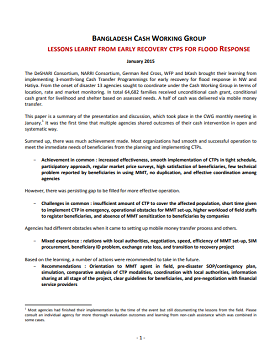
Bangladesh Cash Working Group: Lessons Learnt From Early Recovery CTPS For Flood Response
Report
The DeSHARI Consortium, NARRI Consortium, German Red Cross, WFP and bKash brought their learning from implementing 3-month-long Cash Transfer Programmings for early recovery for flood response in NW and
Hatiya. From the onset of disaster 13 agencies sought to coordinate under the Cash Working Group in...

Electronic Cash Grants in Emergencies: Approaches and lessons learned
Report
Cash distributions in an emergency: A concept that seems so obvious today yet has only recently gained recognition within humanitarian response programming for its speed, efficiency and—above all—effectiveness.
This document provides a snapshot for humanitarian response peers on best practices,...
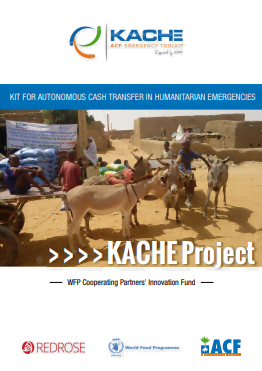
Kit for Autonomous Cash transfer in Humanitarian Emergencies (KACHE)
Guidelines and Tools
The present document reports the development of the Kit for Autonomous Cash transfer in Humanitarian Emergencies (KACHE), built upon Red Rose ONE system© supported by the WFP’s Cooperating Partners’ Innovation Fund (CPIF). Firstly, it gives a brief description of the main features of the kit....

Guidance Notes: Cash Transfers in Livelihoods Programming- West Africa
Guidelines and Tools
A growing acceptance of cash transfers as an inter-sectorial tool is accompanied by a better understanding of this approach and its potential to break the cycle of poverty, after much discussion on the role cash transfers have to play in building resilience. In the Sahel, food security experts have...
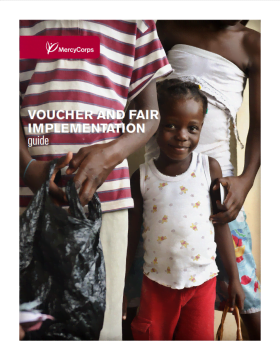
Voucher and Fair Implementation Guide
Guidelines and Tools
Mercy Corps’ Voucher and Fair implementation Guide provides clear, step-by-step guidelines for teams implementing cash, restricted cash, or commodity voucher programmes. Written for an internal audience, the Guide may also be useful for peer agencies.

A Review of Evidence of Humanitarian Cash Transfer Programming in Urban Areas: Annexes
Report
Annexes to accompany the working paper ‘A review of evidence
of humanitarian cash transfer programming in urban areas”
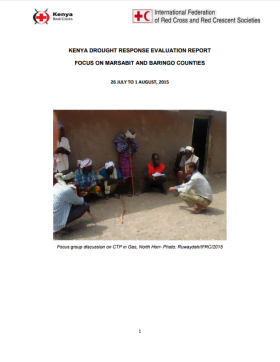
Kenya Drought Response Evaluation Report – Focus on Marsabit and Baringo Counties
Report
An evaluation of a drought response which involved school feeding, cash transfers and nutrition outreach activities.
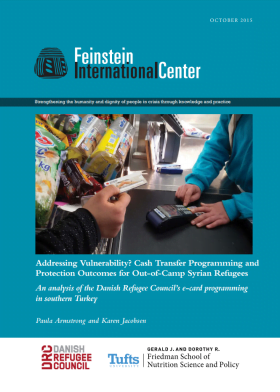
Addressing Vulnerability? Cash Transfer Programming and Protection Outcomes for Out-of-Camp Syrian Refugees
Report
This report explores key issues concerning vulnerability, targeting, and protection in cash transfer programming (CTP) by analyzing a Danish Refuge Council (DRC) project in southern Turkey. It is based on an ongoing “action research” collaboration between DRC and the Feinstein International Center...

Cash Transfer Program in Northern Syria
Report
Humanitarian needs, both in Syria and neighbouring countries (Lebanon, Jordan, Turkey and Iraq), have rapidly increased since the beginning of the conflict. The Aleppo governorate, as one of the county’s most populated areas with a total population of 4,670,000, has suffered from the consequences...

Philippines Haiyan Response – A multi-sectoral review of the use of market analysis and the design and implementation of CTPs
Report
Following Typhoon Haiyan, which hit the Philippines on November 8 2014, at least 45 aid agencies chose to implement Cash Transfer Programming (CTP) to assist the more than 16 million people affected. Cash transfers were a logical approach in a country with developed market systems, strong financial...
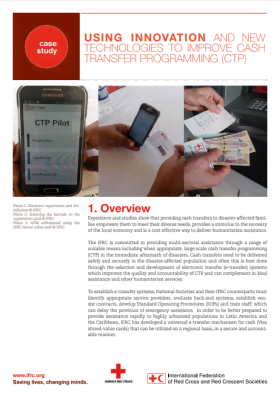
Using Innovation And New Technologies to Improve Cash Transfer Programming (CTP)
Report
Experience and studies show that providing cash transfers to disaster-affected families empowers them to meet their diverse needs, provides a stimulus to the recovery of the local economy and is a cost effective way to deliver humanitarian assistance. The IFRC is committed to providing multi-sectoral...
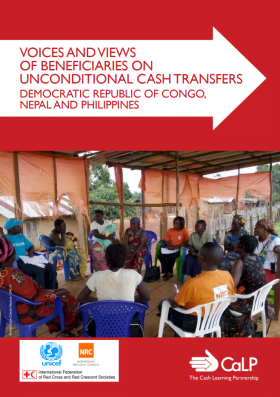
Voices and Views of Beneficiaries on Unconditional Cash Transfers – Democratic Republic of Congo, Nepal and the Philippines
Report
Providing cash in humanitarian emergencies is expanding and the topic is well under discussion within the humanitarian sector with topics ranging from high-level consideration of cash as a tool to transform humanitarian aid, the significance of cash as a way to support beneficiary choice and dignity...

Remittances to Syria: What works, where and how
Report
This study sought to understand remittance flows into Syria, and established that various Informal Value Transfer Systems (IVTS) are used, to the exclusion of the formal banking sector. Registered and unregistered hawala, courier services and family connections are used. Remittances have played an...

EMMA Toolkit
Report
Download the publication file here EMMA is a set of tools (this toolkit) and guidance notes (the reference manual on CD-ROM). It encourages and assists front-line humanitarian staff in sudden-onset emergencies to better understand, accommodate, and make use of market systems. It does not offer a...

Cost-Effectiveness Analysis of Cash-Based Food Assistance Projects: A case study and discussion paper of findings in Niger
Report
Despite recent and expanding literature on cost effectiveness and value for money, there is little by way of guidance for the implementation of cost-effectiveness analysis in humanitarian and development programming. This report distills findings from the literature on ex post cost-effectiveness analysis,...
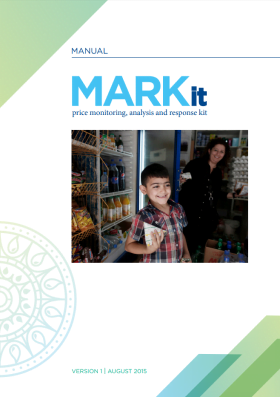
MARKit: Price monitoring, analysis and response kit
Guidelines and Tools
The Price Monitoring, Analysis and Response Kit (MARKit) was developed by representatives from the Local Regional Procurement (LRP) Learning Alliance to guide food assistance practitioners through the steps to monitor markets during the implementation of food assistance programs, and to ensure that...

Cash in Emergencies Toolkit
Guidelines and Tools
Access Toolkit Here Cash transfer based programming (CTP) is an effective and flexible way to support people affected by emergencies, maintaining their dignity and choice, while fostering local economies. CTP includes all forms of cash and voucher-based assistance. The Cash in Emergencies Toolkit has been...
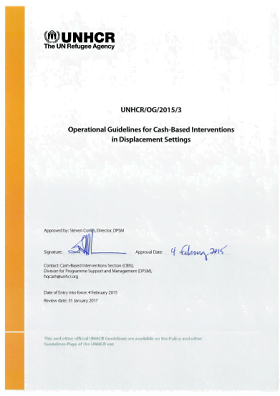
Operational Guidelines for Cash-Based Interventions in Displacement Settings
Report
These operational guidelines support UNHCR and partner staff to determine if and when cash-based interventions (CBIs) are appropriate to meet the needs of refugees and other persons of concern and aids the design and implementation of effective programmes. It focuses on the needs of refugees, but can...

Household Cash Transfer Assessment – Typhoon Haiyan Recovery Response
Report
An estimated 16.1 million people were affected by typhoon Haiyan, with 1.1 million damaged or destroyed homes and as many as 4.1 million people displaced – nearly four times as many as those left homeless by the 2004 Indian Ocean tsunami. At least 6,300 people lost their lives and another 5.9...

2015 State of the Industry Report. Mobile Money
Report
Mobile money is reaching more than 411 million people globally. Moreover, it is available in 85% of countries where the vast majority of the population lacks access to a formal financial institution. This is an extraordinary achievement, demonstrating the power of mobile, underpinned by the critical...
